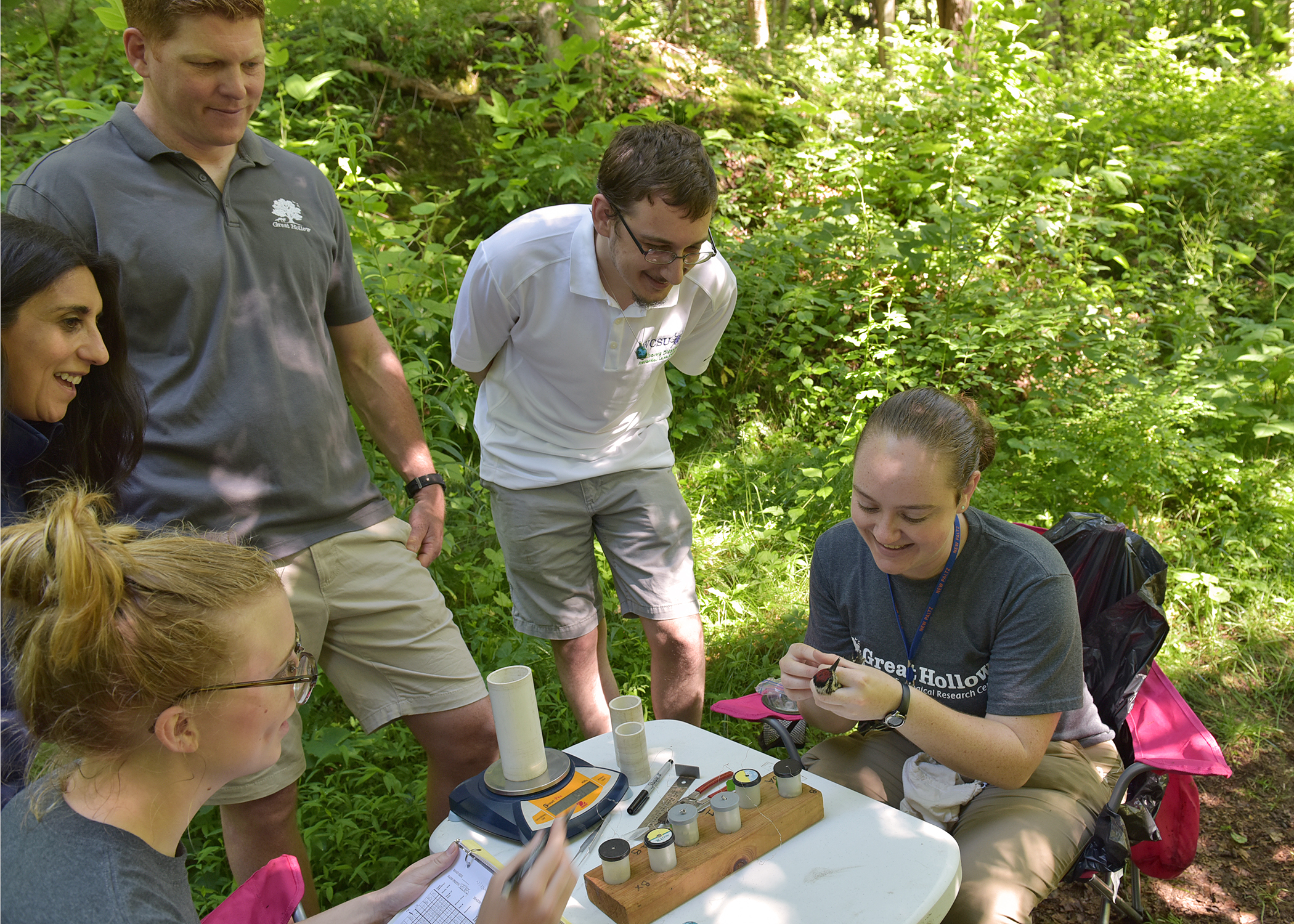
last updated 01.29.24
Great Hollow offers paid summer internships to undergraduate or graduate students who are majoring in the natural sciences and have a strong academic record and an interest in field biology. Interns work under Great Hollow’s scientists to assist with summer research projects, during which they gain experience in study design and a variety of field and lab methods. Interns also help with miscellaneous office duties, community events, animal care, and facility and trail maintenance, and otherwise contribute to the general day-to-day operation of Great Hollow. Internships are typically 8 weeks long, beginning in mid- to late May. They include a weekly stipend as well as shared, on-site housing for those who do not live locally.
2024 Internship Openings:
Great Hollow offers paid summer internships to undergraduate or graduate students who are majoring in the natural sciences and have a strong academic record and an interest in field biology. Interns work under Great Hollow’s scientists to assist with summer research projects, during which they gain experience in study design and a variety of field and lab methods. Interns also help with miscellaneous office duties, community events, animal care, and facility and trail maintenance, and otherwise contribute to the general day-to-day operation of Great Hollow. Internships are typically 8 weeks long, beginning in mid- to late May. They include a weekly stipend as well as shared, on-site housing for those who do not live locally.
Great Hollow is now accepting applications for up to two paid internships for the summer of 2024. The internships will be open to undergraduate or graduate students who are majoring in the natural sciences, have a strong academic record and an interest in field biology, and have demonstrated experience with the identification of Northeastern forest plants, arthropods, and/or birds. Interns will mainly assist with the second year of a 3-year study of the effects of invasive Japanese barberry removal on plant, arthropod, and bird species composition. To be able to conduct the necessary field work for the project, applicants must be skilled at identifying plants, arthropods, and/or birds of northeastern U.S. forests. We do not expect individual applicants to have experience with all 3 taxa, so those with experience with only 1 or 2 are still encouraged to apply. We will attempt to pair 2 interns with complementary skills together (e.g., one person with bird ID skills and another with plant and arthropod ID skills). Aside from working on this project, interns will also assist with acoustic bat surveys (including recorder deployment and downloads, sound-file processing, and data organization, with training provided), offsite wood turtle surveys (transportation provided), and miscellaneous other field work, and occasionally be asked to help with invasive plant removal, trail maintenance, miscellaneous office duties, facility maintenance and cleaning, care of our non-releasable birds of prey, community events, and kids’ education programs, to contribute to the general day-to-day operation of Great Hollow. Some nighttime field work (first 2 hours after sunset) could be periodically required for the bat research.
Internships begin in late May and last approximately 8 weeks (start and end dates slightly flexible). Interns receive a weekly stipend of $450 and free on-site, shared housing.
Minimum Qualifications
-Completion of at least 2 full years of a 4-year university program, majoring in natural resources, conservation biology, ecology, wildlife management, or a similar field.
-Strong identification skills for Northeastern forest plants, insects, and/or birds (by sight and sound). Experience gained solely from the lab section of a college course is insufficient. Applicants must demonstrate other sources of experience (e.g., prior field positions, atlasing efforts, volunteer work, etc.). Bird point-count survey experience is a big plus.
-Ability to enjoy working outdoors for several hours, sometimes under uncomfortable (e.g., hot, buggy) conditions.
-Ability to perform field work early in the morning (e.g., around sunrise) and at night (e.g., first 2 hours after sunset).
-Physically fit and able to hike on rugged terrain for long periods.
-English fluency and ability to verbally communicate effectively.
-Ability to work independently and as part of a team.
-Ability to live in shared, drug-free and smoke-free housing with respect for others.
-Proof of existing health insurance coverage (not provided with internship).
-U.S. citizenship or current authorization to work in the U.S.
Applications will be accepted until April 1 and reviewed in the order in which they are received. To apply, please assemble a single PDF containing (1) a cover letter that includes a clear description of your relevant experience with Northeastern forest plant, insect, and/or bird ID; (2) a resume or CV; and (3) contact info and your relationship to at least two professional references, and email to Great Hollow’s research fellow Sarah Deckel () and executive director Chad Seewagen (. Please label the PDF as “Last name_first name” and put “Last name_2024 Internship Application” in the subject line of your email. Applications that fail to follow these basic instructions may be disqualified.
Past Research Interns
2023
Zachary Nichols, Western Connecticut State University
2022
Julia Nadeau-Gneckow, University of Central Florida
2021
Joan Tremblay, UConn
Max Kirsch, Cornell University
2019
Heidi Faulkner, SUNY College of Environmental Science and Forestry
Hannah Miller, SUNY New Paltz
2018
Evalyn Machia, University of Maine
Clare Quinlan, Miami University
Nick Russo, UConn
Andrew Rapp, College of William & Mary
2017
Nate Diamond, Cornell University
